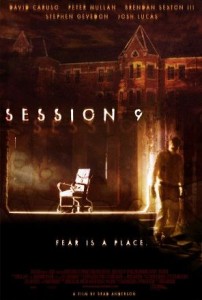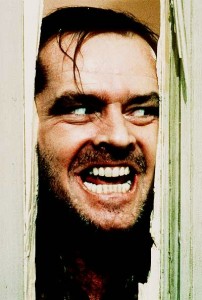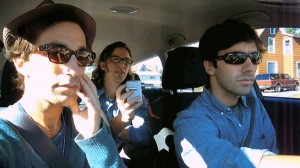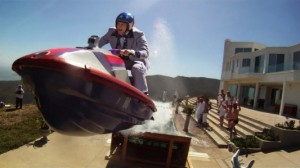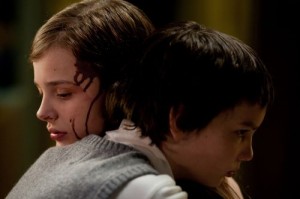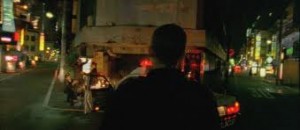Frenzy On Blog Archive for October, 2010
Halloween Festivities
New York City is kind of a nightmare on Halloween. It’s impossible to get a cab, the subways are filled to the brim and the sidewalks seem like they are overflowing. Everybody comes to Manhattan on Halloween to get completely wasted, vomit in the street, and maybe hook up. It’s amateur hour and it’s one of my five least favorite days to go out in NYC (St. Patrick’s Day and New Year’s being high up there). Alas, I’m always compelled to go out and get involved in the festivities, drink too much and then stumble home to see what classic horror films are on TCM.
But book-ending that night of terror, I like to have a few other nights of terror by watching horror movies exclusively, having a marathon in my apartment. Sometimes friends will stop by and catch a movie or two, but I like to get into the Halloween spirit regardless, and I usually pick out a few old standbys and a few new ones. I’m still putting together my list for this year, but I usually always watch Brad Anderson’s Session 9, Kubrick’s The Shining, and often Tobe Hooper’s The Texas Chainsaw Massacre. This year, I think I’m going to throw in Frank Darabont’s The Mist, Georges Franju’s Eyes Without a Face, Troll 2 (I always like a funny one to throw in there) and then I’m still debating which horror films I haven’t seen to add to the program. At this point, it’s getting harder to weave in new horror films that I actually like. It’s becoming increasingly harder for me to get truly scared by horror films, so I’m happy just to find something that gives me the chills or at least tells an entertaining story. So I’ve been looking through Netflix and trying to find horror films I haven’t seen available to watch instantly. I’m thinking about the recent Carriers, Romero’s Survival of the Dead, and maybe the older Girly. I also will make time to watch the premiere episode of Darabont’s adaptation of the Walking Dead on AMC. What else should I add to this list?
But, in the spirit of giving, I wanted to help my NYC peeps find some cool horror festivities during the week and weekend, where they could congregate with fellow horror lovers. And with that in mind, I think the best idea is to check out the Film Society at Lincoln Center’s horror slate called “Scary Movies” that runs from today (Oct. 27th) through the weekend. The program they have sounds pretty excellent, including The Creeping Flesh (a Peter Cushing, Christopher Lee flick), the original Hellraiser, Carrie, and the new Australian horror picture The Loved Ones, which is getting excellent buzz. The Film Society at Lincoln Center has been killing it lately with excellent programs (they recently had a Rohmer retrospective, which was heavenly) and this one is sure to be a lot of fun. Check out the website for more info: http://filmlinc.com/wrt/onsale/scarymovies.html
Elsewhere: The IFC Center is showing midnight screenings of Wes Craven’s A Nightmare on Elm Street through the weekend, Film Forum has Psycho playing all day throughout the weekend as well. But if you’re looking for something a little bit more underground, my good buddy and filmmaker Shal Ngo has put together a horror movie montage called Brain Bludgeon at the reRun theater in DUMBO. Shal is a pretty talented up and coming filmmaker and he spent an inordinate amount of time watching and then sewing together clips from literally hundreds of forgotten horror movies. Check out the trailer.
If you know about anything else going on in NYC for Halloween, let me know and I’ll try to update this post with anything that sounds too good to miss.
2 Comments »The Other Facebook Movie
Catfish was enjoyable to watch, but it unfolded in pretty much the way I would have expected it to. Of course, I couldn’t have predicted exactly what these three young men would find, but from that first instant, it’s clear that it’s not going to end well.
For those who are unaware, Catfish is a documentary in which two young filmmakers (Ariel Schulman and Henry Joost) follow around Schulman’s photographer brother Nev after he befriends a family of artists that live in Michigan. It starts when eight year old prodigy Abby sends Nev a painting she did based on a photograph he took. Impressed by the work of such a young girl, Nev becomes her pen pal, then later chats with her mother and her older sister and brother and becomes friends with them all on Facebook. After a while, Nev becomes rather fond of Abby’s older sister Megan and they start a long-distance relationship of sorts (long phone conversations, constant text contact) despite never having met each other.
One of my issues with the film really has nothing to do with the film itself; it’s about the marketing. So much emphasis on the marketing has been on the “don’t spoil the secret twist for anyone” aspect of the film that it winds up detracting from what is otherwise a rather intriguing story. It’s clear to any sentient human being that this story is not going to work out the way Nev so desperately wants it to and as the evidence of lies begin to mount, I wish I hadn’t been told by the marketing folks to expect some massive twist because it was kind of gently unfolding in a logical way. I think it caused some disappointment on my part, expecting something truly mind-blowing when the reality of the situation was fairly obvious. I’m going to delve into some spoiler-ish territory here, so don’t read onward if you don’t want to know about the “twist” which isn’t really a twist.
I think the film really finds its footing in terms of character and emotion when we reach the second half and discover that Nev has actually been fooled by one sad woman. I think the most heartbreaking aspect of this whole episode is not her almost unbelievably depressing life, but Nev’s reaction to this. I mean, throughout the film I was kind of shaking my head at Nev’s naivete, wondering how he could be so foolish as to be duped by this woman, despite the complexity of her hoax. But when it sinks in for him that this woman that he developed feelings for was really a mother with a husband and two handicapped stepchildren, he does the most remarkable thing: he shows compassion. He doesn’t get angry with Angela or scold her (maybe gently he does), but instead tries to understand her motivations for doing this. One could say that Nev had cameras on him, so perhaps he was merely playing the hero for the sake of the film, but I felt he was genuinely sorry for this woman despite the fact that her actions had clearly hurt him. That, to me, was the heart of the film.
Other than that, the three dudes (including the two directors) are enjoyable enough to be around; there’s a particularly endearing moment when Nev reads some of the risque texts that “Megan” had sent to him after realizing that she’s probably not real.
I suppose my biggest issue with the film was that the filmmakers were kind of narcissistic enough to believe that in the end, their story was the most interesting. In fact, Angela’s story is the most compelling. I think more experienced filmmakers might have gotten to that house and realized, “wow, let’s start here and follow Angela around for a year and learn about her life.” Instead, they exploit her as this kind of tragic villain who swoops in at the end of the film when I think she’s got more of a story to tell. But I think the truth of the matter is that these filmmakers didn’t have the means to follow her around for a year and they seemed too scared around the family to be comfortable enough doing so. Regardless, I felt there was a missed opportunity there.
It’s funny to me when people refer to this as the “other Facebook movie” because I don’t think Catfish or The Social Network are about Facebook. I think they are thematically about social media, but only tangentially. The Social Network is about alienation and the founding of a company while Catfish is really about striving for connection by any means necessary. Facebook, as an entity, is really just a MacGuffin for both of these movies and both films deserve better than to be labeled as merely “Facebook movies.”
1 Comment »Jackass 3-D (Dir. Jeff Tremaine)
As much as I pride myself on my film snobbery, I’m an unabashed fan of the Jackass series and films. I used to say to anyone who would question me, “well, it’s stupid fun, but I like it for some reason.” Well, I no longer think of it as just “stupid fun.” Don’t get me wrong, I don’t think the films are shining examples of witticism. However, they are certainly more witty than people give them credit for. The stunts that they pull are so absurd as to be almost brilliant, but what really gets me are the ad-libbed reactions that Johnny Knoxville or Chris Pontius will throw out there after a stunt, like, “oh man, that hurt to do that to you” after Pontius puts a fish hook in Steve-O’s cheek.
The key to any great comedy is to give us likable characters and put them in precarious situations where we care about the outcome. Jackass has perfected this formula. All of the guys in the films are inherently likable because they are 1) self-deprecating and 2) self-harming; we, as human beings, tend to have a soft spot for people who are self-deprecating and for those that will harm themselves for our benefit. And we always care about the outcome of each of these insane stunts and it’s usually either 1) I hope he doesn’t die and/or get maimed or 2) I hope he doesn’t vomit. What the films do that is somewhat revolutionary is take out the whole business about a plot and story. But, the interesting thing is that over the course of the series and the films, we have certainly seen character growth and bonds. And male bonding is really what the series has always been about; just getting together with your best buddies and doing dumb stunts in the hopes of making your pals laugh.
But enough trying to analyze the complexities of Jackass 3-D. I went to the midnight showing with two of my best friends and we – like most people in the theater – had quite a few drinks beforehand (and during). The crowd was wild, which was what I was hoping for when I decided to see the midnight showing. This is truly one of those must-see theater experiences because it’s not the same watching the film at home, without hearing the crowd collectively go, “ohhhhhhhhh.” I don’t necessarily know that the 3-D part of the film was warranted or that they truly take advantage of it outside of a few scenes at the beginning and end, but I will say that if you’re going to see this movie, then you are going to get exactly what you paid for and signed up for.
I will say that I don’t think the film is as strong as the first two installments. Perhaps it’s a result of getting older (both myself and the crew) or perhaps it’s because there’s only so many new ways to put yourself at risk of death and disease, but the film didn’t make me laugh or cringe as much as the first two. However, it’s still ridiculously funny and one of the best times I’ve had in a theater this year. I don’t want to spoil the stunts for you, but I will say that I enjoyed the scene with Super Mighty Glue, the scene with the gorilla in April and Phil Margera’s hotel room, Bam’s “Rocky” re-enactments, the “Helicockter,” the scene where Wee-Man walks into a bar with his little person lady friend, the scene with Knoxville and the bull, Steve-O and Pontius playing “tee ball,” and a whole handful of others. There were a few parts that fell flat, but the film moves so fast that we don’t have time to notice and nothing really made me gag, which is both a plus and a minus. The sweat-suit cocktail, though, was one of the most disgusting things I’ve ever seen and I mean that as the highest compliment.
Anyway, I’m surprised I was able to write 700 words about a film that is really all about the visceral. And my visceral reaction to the movie was: very, very funny.
Gay Dilemma
Since everyone else is weighing in on this topic, I figured I’d throw my two cents out there.
In case you haven’t heard, Ron Howard’s new movie The Dilemma has a trailer in which star Vince Vaughn calls a car “gay.” This seems like a fairly regular occurrence these days; someone will use the word “gay” in a pejorative way. In fact, even in liberal New York City, I hear that term thrown around by tens of people a day – gay and straight – to refer to something that is not homosexual. In my opinion, using the word “gay” in that manner is inappropriate and wrong and I try my best not to use it in such a way. But, I’m not about to say that characters in films can’t use it.
There has been such an outrage over Vince Vaughn’s stupid line in a trailer for a (probably) stupid movie that they have removed the word from the trailer. Yay for equality? The issue here, for me, is that just because a character in a work of fiction is racist, homophobic, sexist, etc. it does not mean that the creator of that character is. If you disagree with the character’s use of the word, then it’s your right to not like that character. We hear things we don’t want to hear all the time and if we want to, we can be offended by everything we encounter. But once you start censoring what characters in films and literature can or cannot say, then what is the next step? Are we going to go back and remove the name “Nigger Jim” from every copy of The Adventures of Huckleberry Finn? Are we going to edit out the whole “do you know how I know you’re gay?” section from The 40 Year Old Virgin?
What I’m trying to say here is that art shouldn’t have to adhere to the standards of society; that’s why it’s art, it should stand outside of it. Now, one could make the argument that The Dilemma is hardly art, but who gets to be the arbiter of that? Art is subjective. If people want to get up in arms over the use of a possible slur in a film that will probably have no influence on their life? That’s their prerogative, but it seems like an awful waste of time.
6 Comments »Let Me In (Dir. Matt Reeves) – SPOILERS
Tomas Alfredson’s Let the Right One In was one of my favorite films of 2008. It was atmospheric, moody, complex, metaphorical, and romantic in the strangest possible way. I loved that it raised some interesting questions about what it would mean to fall in love with a vampire who will always be 12, how that love would change as one partner aged noticeably. I enjoyed thinking about what it would mean that the vampire looked like a twelve year old, but was in fact much older than that; if that’s the case and this is a vampire that lures 12 year old boys into being her protector and (presumably) lover, then doesn’t that make this vampire a pedophile?
The point is that it was a film that dealt with complexities we would never find in an American film, right?
The remake, entitled Let Me In, surprised me in how faithful it remained to the Swedish original. I would say that it remained true to the mood and atmosphere of the first film while adding some interesting wrinkles here and there as well as making some improvements. One noticeable improvement is that writer/director Matt Reeves excised the subplot with the nosy neighbor who is transformed into a vampire. He manages to keep the iconic image of the woman bursting into flames in her hospital room, but we don’t have to deal with her whole boring back-story.
I also think that Reeves chose two skilled actors in Chloe Moretz (as Abby) and Kodi Smit-McPhee (as Owen), actors who I think help the audience sympathize with them more. The basic outline of their “love” story is intact, but my perception of it changed slightly. I was much more aware of the romantic nature of the film in this version and the ways in which Owen cares for Abby and vice versa. Owen, especially, is almost comic in his empathy. When Abby vomits after trying a Now & Later, Owen’s first reaction is to hug her tightly. It’s a heartwarming moment. Abby, of course, cares very much for Owen, perfectly expressed in the climactic pool scene (more on that later). The way in which she cares for Owen reminded me a bit of the way Adam Sandler’s character expresses his love for Emily Watson in Punch-Drunk Love. When there is an boiling rage inside of you, but you want to express your love, sometimes your love is not expressed in the things you say or do, but in the way you protect someone with your rage. I think that’s the point of Abby and Owen’s love affair, they express their affection in different ways, but they can both recognize that it’s affection regardless.
Another reason that I responded strongly to this film is something my viewing companion brought up. She said there was something about hearing the dialogue in our own language that made the film more effective. I thought it was an interesting point. I love foreign films, love reading subtitles, but there indeed is a difference between hearing words actually spoken than reading them as they are being spoken in a foreign tongue. Not only that, I was better able to appreciate the sense of foreboding and terror because I didn’t have to worry about missing a line of dialogue.
I really have nothing but positive things to say about the film since it’s almost exactly like the original (emphasis on ORIGINAL)…except for the pool scene. I think there are a number of things wrong with the scene as presently constituted, including the fact that it seems to all happen much too quickly. But there is one big difference that really kills it aesthetically and that’s that the bullies decide to turn the light off inexplicably. Turning the lights off makes it hard to see what’s happening and we should be seeing absolutely everything. The power of that scene in the original is that we see what the boy doesn’t as he is drowning. But now, we can’t see much. We see enough to know what’s going on – including a severed head – but it doesn’t have the same impact or the same beauty as the original version of that scene did. It let me down a bit.
I’m also of two minds when it comes to a shot that Reeves inserts of Owen seeing a photo of Abby and the Richard Jenkins/protector character as a young man. It’s implied in the original that the Owen character would now be taking on the “protector” role, but here it’s completely spelled out for us.
Ultimately, I’m not unhappy that the film was made, but I’m not sure it was necessary either. I think the first version is a superior product, despite whatever flaws it might have, but in the end I guess I can’t argue with remaking the film the way it was remade. If nothing else, people who won’t go to films with subtitles will now have a chance to see this story told and told in a similar fashion.
But I think if you’ve seen the original, there’s not really a pressing need for you to see the remake.
1 Comment »Enter the Void (Dir. Gaspar Noe)
I had really high hopes for the latest twisting narrative from Gaspar Noe. I’d been following the film since it’s been in production because the idea behind it was brilliant: it’s told from the perspective of the main character from beginning to end…except the main character dies half an hour into the film, so we follow his spirit as it soars around the city (and backwards and forwards in time). We’ve seen the first-person perspective used in spurts in films like Strange Days, but it seems like Noe has not only employed it for the length of his film, but he’s also perfected it. We truly feel as though we’re seeing the world through the main character’s eyes, rather than a man holding a video camera and running around. In other words, I think the cinematography and look of this strange film is award-worthy, brilliant, some of the best I’ve ever seen. Noe deserves special credit for envisioning and executing a film that is so visually complicated.
However, I don’t even want to describe the plot of the film for you because it’s really not worth it. It’s got drugs, abortion, sex, prostitution, blood…and it’s all, true to Noe’s form, extremely graphic. But sometimes Noe confuses the controversial and gratuitous with interesting. The truth of the matter is that Oscar, the main character, didn’t need to be a drug dealer and his sister didn’t need to be a stripper/prostitute and the film didn’t need to be set in the flashing lights of Tokyo for it to hold our attention. The sheer genius of the cinematography would have kept us focusing on anything, it’s just a shame that Noe couldn’t find a story that was worth telling.
Having said all that, I do think there are some profound points made here about the nature of life and death. Clearly Noe has a view of death that is similar to a kind of Buddhist philosophy and there is even a (rather forced) mention of the Tibetan Book of the Dead. But I don’t think the film is nearly as deep as Noe seems to think it is. As I mentioned earlier, there is an abortion scene and it’s shown in graphic detail and I don’t know what the point is. Is it trying to say something about the tenuous nature of life, how we are all on the precipice of death before we are even born? It’s possible, but I don’t know if I could support that subtext by using the text of the film.
The film is divided into four parts: first we have Oscar alive, doing drugs in his apartment and walking through the streets of Tokyo as a semi-sentient human being until he is shot in a bathroom stall; the second part is Oscar’s life flashing before his eyes and this is not seen directly through Oscar’s eyes, but from behind his head so we see the back of his head in every scene as we learn the history of Oscar’s life and his strange relationship with his sister Linda that borders on the sexual; the third part is Oscar’s spirit floating around Tokyo, mostly following his sister as she has sex with guys; then the fourth part is, well, a surprise I suppose, but I will refer to it here as the “Love Hotel” sequence. To hint at what takes place, I’ll just say: as I’ve spoken about, there is a deeply Buddhist philosophy running throughout the film.
Visually speaking, the film is an absolute masterpiece. I don’t like to throw that word around, but there it is. If you ignore almost every other element of mise-en-scene, then Noe has pulled off one of the finest achievements of the year. But unfortunately, there are a lot of areas where the film falls flat. I’ve already spoken about the plot’s limitations (and lack of aspirations), but the acting is a problem as well. We don’t see much of Nathaniel Brown as Oscar because we see the film through his eyes, but we see a lot of Paz de la Huerta as Linda and she is…well, she’s awful. I’ve admired her work on Boardwalk Empire, but here she is just not a human being. She is almost comically monotone throughout the film and then explodes into histrionics every once in a while, which is almost equally laughable. There is a certain bravery in the way in which she allows Noe to sexualize, fetishize, and downright exploit her naked body, but it doesn’t say a whole lot about her “talent” an actress.
I think this is a film that is worth seeing and it’s one that I will surely watch again, just to bathe in the images of Noe and cinematographer Benoit Debie, who should be nominated for an Academy Award but probably won’t be. I think Noe ultimately misses the mark with what he’s trying to accomplish, but what he gets right is SO right that it almost makes up for the deficiencies.
2 Comments »




